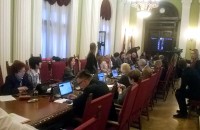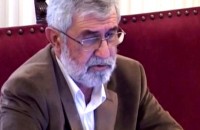On the occasion of 18th Session of the Committee on Labor, Social Issues, Social Inclusion and Poverty Reduction of the Parliamentary  Assembly of the Republic of Serbia, held on March 18th 2015, representatives of the Igman Initiative presented the results of the project Free Movement of Labor Force between the Countries Signatories of the Dayton Agreement using the experiences of the Nordic Model of Cooperation, financed by the Danish Embassy in Belgrade.
Assembly of the Republic of Serbia, held on March 18th 2015, representatives of the Igman Initiative presented the results of the project Free Movement of Labor Force between the Countries Signatories of the Dayton Agreement using the experiences of the Nordic Model of Cooperation, financed by the Danish Embassy in Belgrade.
Aside from the members of the Committee, the session was attended by Aleksandar Popov, Co-president of the Igman Initiative for Serbia, Morten Skovgaard Hansen, Deputy Head of the Danish Embassy in Belgrade and Dragana Savic, Head of the Group for International Cooperation and European Integration of the Serbian Ministry of Labor, Employment and Veteran and Social Issues.
 Aleksandar Popov explained that, within the framework of the project, the Igman Initiative expert group worked on the analysis of legislative framework in Bosnia and Herzegovina, Croatia, Montenegro and Serbia and bilateral agreements concluded between them, as well as on drafting recommendations aimed at competent government institutions in these countries, using positive experiences of the Nordic countries as example. The expert recommendations were presented at the Igman Initiative session held on November 28th 2014 in Podgorica, with the presence of the representatives of competent ministries and parliamentary committees from all four countries. Project activities resulted in forming of an inter-state joint Working Group on Free Movement of Labor Force between the four countries.
Aleksandar Popov explained that, within the framework of the project, the Igman Initiative expert group worked on the analysis of legislative framework in Bosnia and Herzegovina, Croatia, Montenegro and Serbia and bilateral agreements concluded between them, as well as on drafting recommendations aimed at competent government institutions in these countries, using positive experiences of the Nordic countries as example. The expert recommendations were presented at the Igman Initiative session held on November 28th 2014 in Podgorica, with the presence of the representatives of competent ministries and parliamentary committees from all four countries. Project activities resulted in forming of an inter-state joint Working Group on Free Movement of Labor Force between the four countries.
 Dragana Savic stated that the Ministry was involved in the project activities on expert level from the very beginning of the project implementation. The Ministry will continue to support this initiative and it is expected that the continuation of this project will lead to intensified cooperation between four countries in this area. Ministry is currently in charge of two Negotiating Groups for chapters 2 – Free Movement of Labor Force and 19 – Social Policy and Employment. Aside from European integration, Serbia is a signatory country of numerous international agreements and conventions, where experiences of the Nordic countries as well as recommendations of the Igman Initiative expert team can be of great assistance.
Dragana Savic stated that the Ministry was involved in the project activities on expert level from the very beginning of the project implementation. The Ministry will continue to support this initiative and it is expected that the continuation of this project will lead to intensified cooperation between four countries in this area. Ministry is currently in charge of two Negotiating Groups for chapters 2 – Free Movement of Labor Force and 19 – Social Policy and Employment. Aside from European integration, Serbia is a signatory country of numerous international agreements and conventions, where experiences of the Nordic countries as well as recommendations of the Igman Initiative expert team can be of great assistance.
Vesna Rakonjac, Chairwoman of the Committee stated that the recent adoption of the Labor Law and the Law on the Employment of Foreigners, both of which are harmonized with the EU legislation, received full support and praise from the European Commission. With regards to the conclusion of bilateral agreements, special attention should paid to the protection of workers as well as responsible behavior of the employers in the country in which they operate, whether they employ domestic of foreign labor force. Igman Initiative project can be to the benefit of both the countries signatories of the Dayton Agreement and labor force which will be secured regarding pension, social and health insurance and convalidation of employments insurance.
Vesna Rakonjac highlighted that aside from this area it is necessary to improve cooperation in other areas, such as environment protection and joint management of natural and manmade disasters, as the countries signatories of the Dayton Agreement are interlinked. If an incident occurs in one country it will inevitably reflect on other countries in the region. Those areas are not only interesting but also obligatory for the countries that are on their path to the European Union.
 Morten Skovgaard Hansen stated that he is very pleased that the Danish Embassy decided to support this project. Although positive experiences of the Nordic countries could be utilized to the benefit of the Western Balkan countries, these countries should seek solutions which will be suitable in their context. It took years, even decades, for the Nordic countries to develop successful mutual cooperation, where step-by-step approach was utilized with clearly defined long-term ambitious goals for a very close cooperation. Aside from national legislation and bilateral agreements information sharing, between the countries involved and to the citizens about opportunities, is very important.
Morten Skovgaard Hansen stated that he is very pleased that the Danish Embassy decided to support this project. Although positive experiences of the Nordic countries could be utilized to the benefit of the Western Balkan countries, these countries should seek solutions which will be suitable in their context. It took years, even decades, for the Nordic countries to develop successful mutual cooperation, where step-by-step approach was utilized with clearly defined long-term ambitious goals for a very close cooperation. Aside from national legislation and bilateral agreements information sharing, between the countries involved and to the citizens about opportunities, is very important.
Next meeting of the recently established interstate Working Group on Free Movement of Labor Force will be held at the Croatian Parliament on the invitation of Silvano Hrelja, Chairman of the Committee on Labor, Pension System and Social Partnership.

